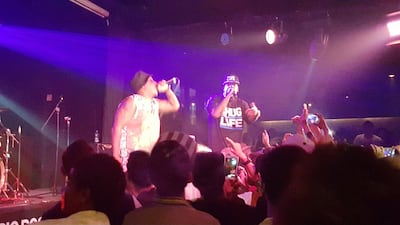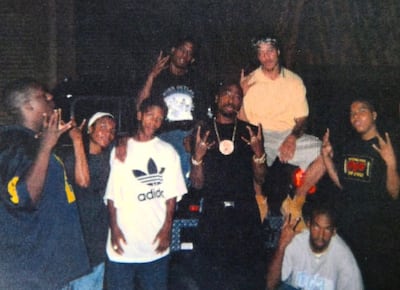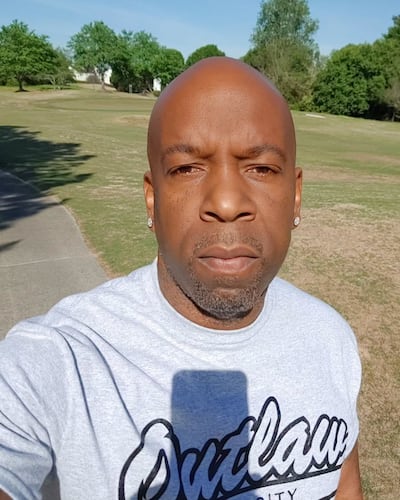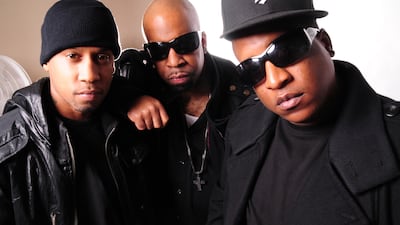"You know what? We are the last two breathing.”
Those words echoed through Bur Dubai's The Music Room, a much–loved but now–closed venue, where The Outlawz performed a riotous show in 2015 to a near–capacity crowd of 700.
The declaration came from Young Noble after surveying the crowd – many wearing band shirts emblazoned with images of the group’s founder, the late Tupac Shakur – before turning to bandmate EDI Mean.
What made it more plaintive than a boast was who wasn’t on stage. Fellow band member Hussein Fatal, who was due to perform in Dubai, had died in a car crash weeks earlier. Rather than cancel the gig, the group pressed ahead. The Dubai show – one of The Outlawz’s first international appearances since the tragedy – went ahead not as a tribute, but another chapter in a group whose inception and path have been mired in loss.

That story appeared to reach its bleak denouement this week when Young Noble, real name Rufus Cooper III, was found dead at his Atlanta home on Friday at age 47.
EDI Mean, real name Malcolm Greenidge, and now the last remaining member of the group, shared his grief on Instagram: “My brother and partner for over 30 years took his life this morning. Rest in power, Rufus ‘Young Noble’ Cooper. I obviously am in no shape to talk about this right now, so please give his family and I some time to process this. Mental illness is a real battle being fought by so many. Check in on your folks.”
Former member Napoleon – now known as Mutah Beale after embracing Islam and currently residing in Saudi Arabia – also posted a tribute: “From Allah we belong to Allah we return. I received disturbing news that Young Noble from the Outlawz has passed away. May Allah make this time easy for his family, his wife and kids.”

Grief has long been a defining motif for a group marked by the loss of its members. Formed by Tupac in 1995, The Outlawz were not just his backing crew for live shows, but a collective meant to embody his revolutionary spirit.
Each member adopted a name drawn from the United States’ list of past and present geopolitical adversaries – Hussein Fatal, Napoleon, Yaki Kadafi and EDI Mean, the latter a play on Ugandan dictator Idi Amin. Young Noble, who joined in 1996 as the last addition to the group, was the only member not given a politically charged moniker.
His arrival was one of Tupac’s final creative decisions before he was shot in Las Vegas that same year. Two months later, Kadafi – who had been in a car behind Tupac’s on the night of the shooting – was also killed, reportedly under unrelated circumstances.
That foreboding backdrop coloured the 1999 debut album Still I Rise, credited to Tupac and The Outlawz and featuring unreleased vocals from Tupac. The reaction was muted, perhaps because it occupied that uncomfortable space of being more reverent of Tupac than a true rejuvenation for the group.
That creative territory became something of a niche for the group. It wasn’t common in hip-hop, but had precedent in rock with acts such as Dead and Company, who continue to release new works, while also performing tracks from their original incarnation, The Grateful Dead.
Independent releases such as 2000’s Ride Wit Us or Collide Wit Us, 2001’s Novakane, and the following year’s Neva Surrenda serviced that fanbase with little fanfare, as Hussein Fatal left the group in 1999 before returning in 2010 to record on Perfect Timing. Meanwhile, Napoleon eventually left the music industry in 2005 after converting to Islam four years prior.
Young Noble, along with EDI Mean, became the group's anchor – first by necessity, then by choice. He toured when possible, released solo material and kept The Outlawz name alive even as industry recognition faded. The commitment wasn't nostalgic, but practical. Someone had to carry the legacy that remained while also supporting his family.
The night before the Dubai concert, I joined them at a Lebanese restaurant in Dubai Marina. A friend had invited me along to witness what turned out to be the first time in more than a decade that Young Noble, Napoleon and EDI Mean had shared a table. They reminisced quietly, and I left early, leaving them to their moment. It was a small piece of hip-hop history – underreported, but one that mattered.
Noble's health began to decline in the following years. He suffered a heart attack in 2021 and many of his social media posts from that period were reflective and personal, framed around healing.
As hip-hop celebrated its 50th anniversary in 2023, many of The Outlawz’s peers were receiving due recognition. Wu-Tang Clan landed a hit biographical drama series in 2019. A Tribe Called Quest was inducted into the Rock’n’Roll Hall of Fame in 2024 and De La Soul’s venerated catalogue returned to streaming platforms in 2023, but The Outlawz were largely absent from the conversation.
Perhaps this was because their story never quite fit the legacy narrative. They weren't viewed as a creative collective, but as a group built to amplify the voice of its founder. The tragedy – now fully underscored by Young Noble's death – is that they never truly had the chance to redefine themselves.

In 2015, Noble spoke plainly when I interviewed him for The National. When I asked how he managed to continue The Outlawz despite the tragedy surrounding the group, his no-nonsense response was true to the man.
"Considering all the stuff we went through, we should have lost our minds by now. You go through so much stuff and you are traumatised and you don't know it. I mean, we still didn't get over Tupac's and Kadafi's passing and all the other homies that we lost as well," he said. "But we have children and families that look to us to provide and take care of, and to them our failure is not an option."
He said it with more clarity than bitterness. Young Noble chose to carry one of hip-hop's heaviest legacies. With his loss, we're left to consider how weighty it must have been.




